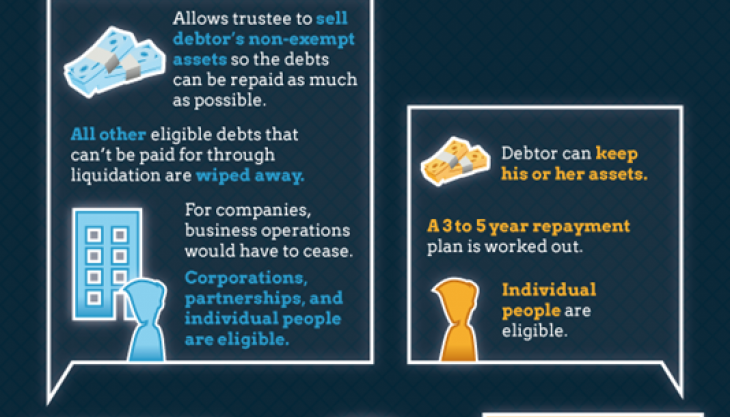Overcoming the Top 5 Fears About Bankruptcy
Submitted by Rachel R on Tue, 01/08/2013 - 10:16am

Image source: totalbankruptcy.com
When you're in serious financial distress, you might not realize that bankruptcy is a viable option to help turn things around. There are many misconceptions and fears about bankruptcy that you need to know more about before making a decision. No other financial or legal process has quite so many associated urban myths. Here are the top five myths and fears people have regarding bankruptcy filings, and why they're not valid.
1. Your Credit Life is Over with Bankruptcy. Not true! Yes, the fact that you declared bankruptcy will be on your credit report for 7 years. But you can immediately start rebuilding a better credit history as soon as your bankruptcy is complete with the actual “discharge” of the debts included in the filing, and sometimes even before that. One of the first things you can do is to obtain a “secured” credit card. This type of card is backed up by a deposit you make in advance to act as a guarantee, like collateral, for the credit being extended to you. You might set up a card with a $500 credit limit by making a $500 deposit to the issuer. After some period of time, during which you make all your payments on time, the card issuer may decide that you can handle a higher credit limit. Even after bankruptcy, you can repair your credit score to above 700 within a couple of years, and you may be surprised by how many lenders are willing to extend credit even before that.
2. Everyone Will Know You Filed for Bankruptcy. This is also largely not true. The only people who will really know are the people you tell, and any potential creditors that look into your credit history. Yes, the bankruptcy records are public, but they’re not typically listed in the newspapers or other media. You can also file your bankruptcy with a court outside your hometown for added privacy. If privacy is a major concern, discuss this issue with your attorney. Additional options may be available to help protect your privacy.
Image source: totalbankruptcy.com
3. Bankruptcy Means You are a Failure. This is only true if you decide to believe that. The bankruptcy laws were created in order to give people a chance for a fresh start. Yes, you made some mistakes or bad decisions or were the victim of circumstances beyond your control. That doesn’t make you a failure. It means you got in over your head. The important thing to emphasize is that you finally recognized it and had the wisdom to do something about it! There are countless examples of companies, entrepreneurs, celebrities, and regular people who survived and thrived after bankruptcy.
4. Bankruptcy Means You’ll Lose Your Home. It could mean that, but for the most part it doesn’t. There are federal laws and state laws that protect some amount of equity in your home. As long as you’re within those limits, you can retain your home in spite of bankruptcy. If you have more equity in your home than the homestead exemption will protect, then you could be forced to sell your home in order to pay off some of your creditors. The amount of home equity protected by federal law is $20,000. State homestead exemptions vary widely, so it’s definitely worthwhile to find out the amount for your state. Some states protect much less than the federal government, but many protect much more, even up to the full value of your home.
5. If You File, Your Spouse Has to File as Well. This one is also not true. What is true is that when putting together your overall financial picture in terms of income and expenses, you have to account for your spouse’s income. But your spouse doesn’t have to file bankruptcy with you, and your filing should not affect your spouse’s credit at all. If your spouse has significant assets, they should be protected as long as they are not jointly held.
Image source: totalbankruptcy.com
If your financial woes seem insurmountable, it may be time to consider a bankruptcy filing. We hope that the five myths and fears we’ve presented here help you to make an informed decision about what to do. The bankruptcy laws were designed to help you make a fresh start. And isn’t that exactly what you’re looking for? Contact a qualified bankruptcy attorney today to start your path to financial recovery.
Dedicated to helping residents of North Carolina find the best solutions to their debt problems. Don’t waste another day worrying about your debt. Call +1-833-627-0115 today to schedule a free initial consultation to discuss your bankruptcy options.
Debts Hurt! Got debt? Need help? Get started below!
Serving All of North Carolina
- Bankruptcy Attorneys Raleigh NC (North)
- Bankruptcy Attorney Fayetteville NC
- Bankruptcy Attorney Durham NC
- Bankruptcy Attorneys Wilson NC
- Bankruptcy Attorneys Greensboro NC
- Bankruptcy Attorneys Southport NC
- Bankruptcy Attorneys Wilmington NC
Bankruptcy Attorneys Raleigh NC (North)
6616 Six Forks Rd #203 Raleigh, NC 27615 North Carolina
Tel: (919) 847-9750

Bankruptcy Attorney Fayetteville NC
2711 Breezewood Ave Fayetteville, NC 28303 North Carolina
Tel: (910) 323-2972

Bankruptcy Attorney Durham NC
1738 Hillandale Rd Suite D Durham, NC 27705 North Carolina
Tel: (919) 286-1695


Bankruptcy Attorneys Greensboro NC
2100 W Cornwallis Dr. STE O Greensboro, NC 27408 North Carolina
Tel: (336) 542-5993

Bankruptcy Attorneys Southport NC
116 N Howe St. Suite A Southport, NC 28461 North Carolina
Tel: (910) 218-8682

Bankruptcy Attorneys Wilmington NC
116 N. Howe Street, Suite A Southport, NC 28461 North Carolina
Tel: (910) 447-2987
